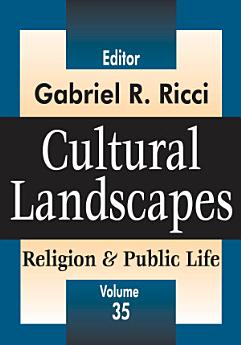Cultural Landscapes: Religion and Public Life
Feb 2018 · Routledge
Ebook
167
Pages
family_home
Eligible
info
reportRatings and reviews aren’t verified Learn More
About this ebook
Adualism between man and nature has been a persistent feature of Western thought and spirituality from ancient times to the present. The opposition of mind and body, consciousness and world has tended to obscure the ways in which humans are ecologically part of interconnected systems, some of which are obvious while others operate in hidden but life-sustaining ways. Cultural Landscapes explores the physical ways in which we are intimately linked to the land and the intellectual and aesthetic connections human consciousness has with the landscape. Following the editor's introductory essay, the lead article by Jame Schaeffer, "Quest for the Common Good: A Collaborative Public Theology for a Life-Sustaining Climate," assesses the lightning rod issue of global warming in the context of a public and ecumenical theology and sets the tone for this normative assessment of our relationship with nature. Likewise, David Kenley's essay, "Three Gorges be Dammed: The Philosophical Roots of Environmentalism in China," reveals the traditional philosophical and cultural values that can sustain a vital environmentalism in the East. David Brown's historical insights into the use of the American landscape to define historical writing complement Patricia Likos-Ricci's historical treatment of nineteenth-century landscape painting and the first call to preserve wilderness in the United States. Matt Willen, "An Feochszn," and David Martinez, "What Worlds are Made of: The Lakota Sense of Place," both demonstrate how space is transformed into place through song and mythic tales. On a metaphysical note, Andreas Philippopoulos-Mihalopolos' essay "On the Line of the Horizon, Anxiety in de Chirico's Metaphysical Spaces," provides the reader with psychological and existential insights into the disorienting paintings of de Chirico, and Gabriel Ricci's concluding essay tours the landscape that underpins Heidegger's ontological speculations. The contributions to this volume are posited on the belief that culture, society, and human history are ultimately rooted in the natural world. This integration may explain why humanity has always looked to nature for moral and ethical guidelines. Gabriel R. Ricci is associate professor of humanities and the chair of the Department of History at Elizabethtown College in Pennsylvania. He is the author of Time Consciousness: The Philosophical Uses of History, published by Transaction.
Rate this ebook
Tell us what you think.
Reading information
Smartphones and tablets
Install the Google Play Books app for Android and iPad/iPhone. It syncs automatically with your account and allows you to read online or offline wherever you are.
Laptops and computers
You can listen to audiobooks purchased on Google Play using your computer's web browser.
eReaders and other devices
To read on e-ink devices like Kobo eReaders, you'll need to download a file and transfer it to your device. Follow the detailed Help Center instructions to transfer the files to supported eReaders.







